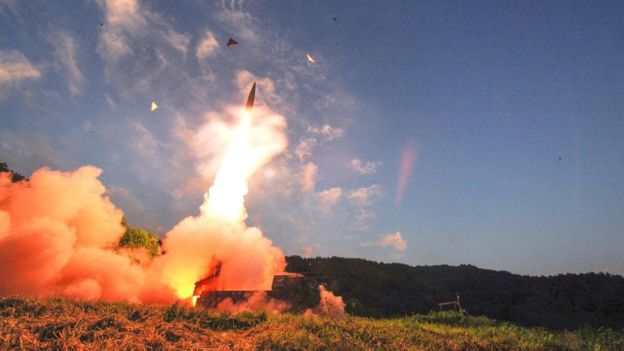South Korea has conducted a missile drill simulating an attack on the North Korean nuclear site, in response to Pyongyang's sixth test.
The live-fire exercise saw rockets launched from fighter jets and ballistic missiles from the ground.
It came as US defence chief James Mattis warned that any threat to the US or its allies by Pyongyang would be met with a "massive military response".
The North says it tested a hydrogen bomb that can fit a long-range missile.
Pyongyang has repeatedly defied UN sanctions and international pressure by developing nuclear weapons and testing missiles, and the provocations have only intensified.
In the past two months it has conducted intercontinental ballistic missile tests, sending one over mainland Japan into the Pacific Ocean. It has also threatened to send missiles towards the US Pacific territory of Guam.
The UN Security Council is to hold an emergency meeting on Monday to discuss its response.
Ahead of that meeting, South Korea and Japan's leaders agreed to push for a stronger UN resolution on North Korea, said a South Korean presidential palace spokesman.
The security council last imposed sanctions in August, targeting North Korean exports.
What is the significance of the drills?
The BBC's Robin Brant in Seoul says the drill was designed to show the country moving to a high state of alert. It tested conventional weapons - the country does not have nuclear capability.
But South Korea's military said on Monday that the simulated target was "set in consideration of" Punggye-ri, the site where North Korea carried out its test.

"The training demonstrates the South Korean military's resolve to destroy not only the origin of provocation but also the enemy's leadership and supporting forces if they threaten the security of our people," Army Col. Roh Jae-cheon, the army spokesman is quoted by South Korea's Yonhap news agency.
South Korea and the US also agreed "in principle" to revise current guidelines so that the South can double the maximum payload of its ballistic missiles, Yonhap also reported.





